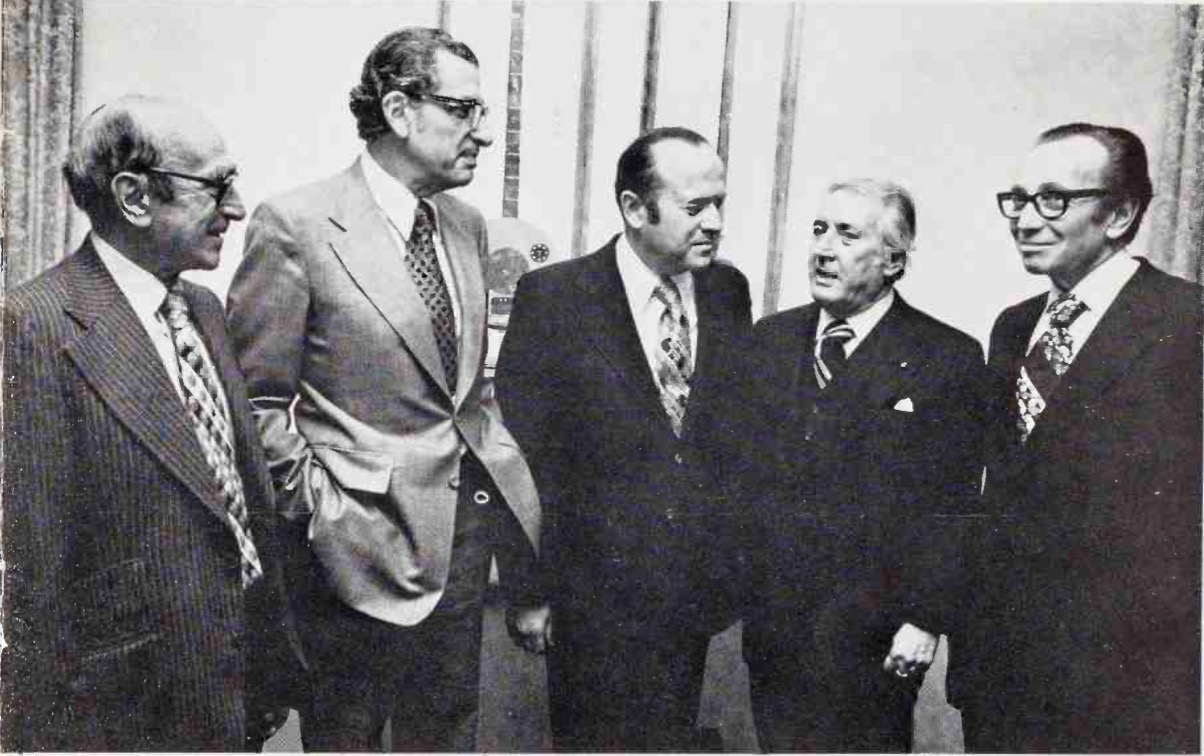Former HIAS President Carl Glick Dies at 98
By Max J. Rosenthal, HIAS.org
Apr 03, 2020

Then-HIAS President Carl Glick (second from left) meets with members of Congress and fellow HIAS leaders at the organization's 91st Annual Meeting in 1974.
(HIAS archives)
Carl Glick, who served as president of HIAS from 1973 to 1979 and for decades on its board of directors as both a member and chairman, died of natural causes in New York City on March 22. He was 98.
“Carl was a walking history book for HIAS, always reminding us about the impact HIAS had on so many lives over the decades,” said Mark Hetfield, HIAS’ current president and CEO. “But Carl was not just a HIAS historian, he was a historical figure himself.”
Glick, the son of Jewish immigrants, was born in Brooklyn, New York, on Oct. 21, 1921, and lived in New York City throughout his life. After graduating from City College of New York in 1942, he enlisted in the U.S. Army and eventually rose to the rank of captain, serving overseas as a finance officer in the Philippines. He returned home to New York after the war to pursue what became a successful career in investment banking and start a family.
His deep involvement in the Jewish community began after a trip to Israel in 1967 with what was then called United Jewish Appeal. “When I got back, I became involved more directly with the Wall Street division of UJA,” he said during a 1989 interview with the American Jewish Historical Society. Glick went on to lead multiple American Jewish organizations, including HIAS, the Jewish Association for Services for the Aged, the America-Israel Cultural Foundation, and others. "Carl raised the bar in defining what Tikkun Olam means," said Dale M. Schwartz, who served for decades on the HIAS board of directors with Glick.
Robert D. Aronson, the current chair of HIAS’ board of directors, said that Glick “never, ever backed down from expressing his opinions,” even when arguing with top American and Israeli leaders. “He was an important voice within HIAS in asserting the right of Jews to exercise choice in seeking countries of their desired refuge and this position clearly led many Jews to seek new lives in safety and freedom,” Aronson said.
Marianne Rohrlich, the elder of Glick’s two daughters, recalled that particular interest in helping Jews around the world escape persecution. “His thing was to be certain to get people to safety who were in harm’s way,” she said. “He was very proud of what he did.”
Indeed, Glick’s presidency was dominated by his work on behalf of Jews attempting to flee persecution in the Soviet Union. He organized HIAS’ support of the thousands of Soviet Jews who came to the United States and lobbied the U.S. government to make their resettlement easier. Under his leadership, HIAS successfully convinced the State Department to provide $300 grants for each Soviet Jewish refugee, making it easier for local communities to bring them in, and helped cut admission times from months to weeks.
 All of these acts took place alongside Glick’s constant efforts to aid Jews from many other countries, particularly across Eastern Europe and the Middle East. But Glick also helped HIAS support non-Jewish refugees.
All of these acts took place alongside Glick’s constant efforts to aid Jews from many other countries, particularly across Eastern Europe and the Middle East. But Glick also helped HIAS support non-Jewish refugees.
In 1972, Ugandan dictator Idi Amin expelled his country’s Asian community, leaving some 6,000 of them stateless and in need of resettlement. At the time, U.S. resettlement agencies worked almost exclusively with refugees with ties to their communities. However, HIAS agreed to sponsor 117 Asian Ugandans to come to the United States, and Glick was there to welcome the first of them when they arrived at New York’s JFK airport that November. Later during his tenure, HIAS helped resettle thousands of refugees from Vietnam. These efforts paved the way for HIAS’ present-day work with refugees and asylum seekers from all faiths and backgrounds.
Carl Glick will be deeply missed by his friends and former colleagues at HIAS, for whom his memory is a blessing.



